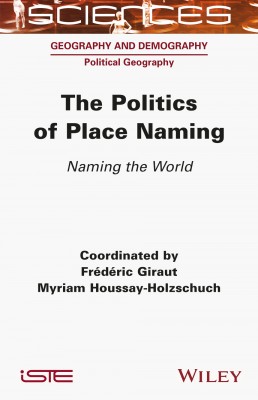
Naming the places of the world is an essential human act of territorialization. As the subject of conflict or dispute, naming plays out in numerous ways that involve collective and individual relationships to space, whether functional or imaginary, as well as the identities related to them. Name traces also differ together with their inscription within landscapes and history.
Names constitute a heritage, they bear witness, they mark places and thus contribute to the foundation of territories. Beyond place names, place naming reveals the functions and uses of names, but also the contradictory meanings that society bestows on them.
With this framework in mind, that of critical toponymy, The Politics of Place Naming considers different points of view when studying place naming. These vary from linguistics to political and cultural geography, via history, anthropology, cartography, urban planning, digital humanities, subaltern studies and many other disciplines. This book honors that transversality by taking such studies into account in its examination of place naming.
1. Naming the World: Place-Naming Practices and Issues in Neotoponymy, Frédéric Giraut and Myriam Houssay-Holzschuch.
2. Commemorative Place Naming: To Name Places, to Claim the Past, to Repair Futures, Derek H. Alderman.
3. The Named, Lived and Contested Environment: Towards a Political Ecology of Toponymy, Sébastien Boillat.
4. Naming the Conquered Territories: Colonies and Empires – Beneath and Beyond the Exonym/Endonym Opposition, Fédéric Giraut.
5. “Addressing the World”: A Political Genealogy of the Street Address, Reuben Rose-Redwood, Anton Tantner and Sun-Bae Kim.
6. Toponymic Commodification: Thematic Brandscapes, Spatial Naming Rights and the Property–Name Nexus, Jani Vuolteenaho.
7. The Toponymy of Tourism and Leisure: General Framework and Lessons from France, Christophe Gauchon.
8. Transport Toponymy: For a Critical Study of the Toponomy of Places of Mobility, Lucas Destrem.
9. The Toponymy of Informal Settlements in the Global South, Melissa Wanjiru-Mwita.
10. The Map, the Name and the Territory: Toponymic Struggles in the Era of Cartographic Post-Sovereignty, Matthieu Noucher.
11. What Africa Might Contribute to Critical Toponymy, Michel Ben Arrous and Liora Bigon.
Frédéric Giraut is a political geographer. He studies borders and place naming in different contexts. He currently heads the “Naming the World” UNESCO chair in inclusive toponomy at the University of Geneva in Switzerland.
Myriam Houssay-Holzschuch is a geographer and professor at Grenoble Alpes University and the PACTE laboratory in France. Her research focuses on post-apartheid South Africa, and South African cities from a social and political geography perspective, as well as on critical epistemologies and pedagogies.